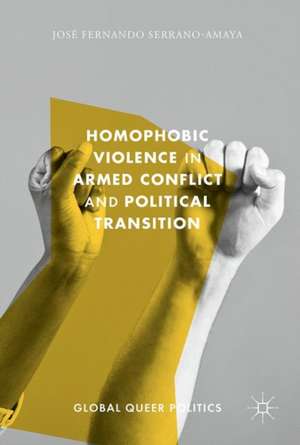Homophobic Violence in Armed Conflict and Political Transition: Global Queer Politics
Autor José Fernando Serrano-Amayaen Limba Engleză Hardback – 16 aug 2017
| Toate formatele și edițiile | Preț | Express |
|---|---|---|
| Paperback (1) | 176.96 lei 6-8 săpt. | |
| Springer International Publishing – 12 mai 2018 | 176.96 lei 6-8 săpt. | |
| Hardback (1) | 639.90 lei 6-8 săpt. | |
| Springer International Publishing – 16 aug 2017 | 639.90 lei 6-8 săpt. |
Preț: 639.90 lei
Preț vechi: 752.83 lei
-15% Nou
Puncte Express: 960
Preț estimativ în valută:
122.45€ • 128.10$ • 101.72£
122.45€ • 128.10$ • 101.72£
Carte tipărită la comandă
Livrare economică 03-17 aprilie
Preluare comenzi: 021 569.72.76
Specificații
ISBN-13: 9783319603209
ISBN-10: 3319603205
Pagini: 187
Ilustrații: XXIV, 186 p.
Dimensiuni: 148 x 210 mm
Greutate: 0.4 kg
Ediția:1st ed. 2018
Editura: Springer International Publishing
Colecția Palgrave Macmillan
Seria Global Queer Politics
Locul publicării:Cham, Switzerland
ISBN-10: 3319603205
Pagini: 187
Ilustrații: XXIV, 186 p.
Dimensiuni: 148 x 210 mm
Greutate: 0.4 kg
Ediția:1st ed. 2018
Editura: Springer International Publishing
Colecția Palgrave Macmillan
Seria Global Queer Politics
Locul publicării:Cham, Switzerland
Cuprins
1. Sex, Violence and Politics: The Research Problem.- 2. Armed Conflict and Sexual Para-Politics in Colombia.- 3. Homophobia in Apartheid and Post-Apartheid South Africa.- 4.the Chiaroscuro of Sexual Politics.- 5. Telling Truths about Violence.- 6. Gender and Sexual Orders Making the New Society.
Notă biografică
José Fernando Serrano-Amaya is Postdoctoral Fellow of Education and Social Work at The University of Sydney, AU. He has been a researcher for NGOs, policy maker in public institutions and university lecturer in Colombia.
Textul de pe ultima copertă
This book argues that homophobia plays a fundamental role in disputes for hegemony between antagonists during political transitions. Examining countries not often connected in the same research—Colombia and South Africa—the book asserts that homophobia, as a form of gender and sexual violence, contributes to the transformation of gender and sexual orders required by warfare and deployed by armed groups. Anti-homosexual violence also reinforces the creation of consensus around these projects of change. The book considers the perspective of individuals and their organizations, for whom such hatreds are part of the embodied experience of violence caused by protracted conflicts and social inequalities. Resistance to that violence are reason to mobilize and become political actors. This book contributes to the increasing interest in South-South comparative analyses and the need of theory building based on case-study analyses, offering systematic research useful for grass rootorganizations, practitioners, and policy makers.
Caracteristici
Examines countries not often connected in the same research: Colombia and South Africa (South-South comparative analyses) Suggests that homophobic violence is an intrinsic component of armed conflict and political transition Provides valuable, systematic analysis for a time in which sexual- and gender-based discrimination against individuals and collectives is being increasingly recognized in the international arena








